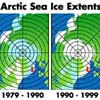| . |  |
. |
|
By 2015 Forecasts ONR
The Arctic ice cap is shrinking that much is known with certainty. Over the past century, the extent of the winter pack ice in the Nordic Seas has decreased by about 25%. Last winter the Bering Sea was effectively ice-free, which is unprecedented, and if this big melt continues, some say the formerly ice-locked Arctic will have open sea lanes as soon as 2015. By 2050, the summertime ice cap could disappear entirely. "Although recent terrorist events keep our minds occupied elsewhere in the world, what a navigable Arctic means for our national security is significant," says Dr. Dennis Conlon, Program Manager for Arctic Science at the Office of Naval Research. "Geographical boundaries, politics, and commerce changes would all become issues." In April 2001, the Office of Naval Research co-sponsored a meeting of Arctic subject matter experts from the U.S., Canada, and Great Britain in a preliminary attempt to address the capabilities that would be required for naval forces to operate in the Arctic. Their report has just been released, and it speaks to the national and strategic issues surrounding naval ship and aircraft operations in an ice-free Arctic, including policy, doctrine, and possible new systems and ship and aircraft designs. The potential implications of an ice-free Arctic are enormous. Both the Northern Sea Route (north of Russia) and the Northwest Passage (through the Canadian archipelago) provide far shorter routes from Europe to Asia, though both routes are claimed to be through national waters. An increased level of transnational activity might give rise to adversarial action, international criminal and terrorist elements, and environmental challenges. Disappearance of the ice canopy would eliminate a haven now provided to submarines, and the acoustic environment would drastically change. An ecological disruption due to climate and habitat changes would affect marine mammal populations, and this in turn would affect indigenous peoples. One significant conclusion was reached in the report: the U.S. Navy must rely on bilateral and multinational alliances, especially with Canada and Russia, in order to deal effectively and fairly with an ice-free Arctic. Ensuring access and stabilizing the global commons would be the most overriding reason for increased operations in what would remain a very hostile environment, ice or no ice. Naval Ice Center, the Oceanographer of the Navy, and the Arctic Research commission. Related Links Office of Naval Research SpaceDaily Search SpaceDaily Subscribe To SpaceDaily Express  Greenbelt - Oct 1, 2001
Greenbelt - Oct 1, 2001Largely natural "ups and downs" in a weather system centered near Iceland have contributed to regional variations and an overall decrease in Arctic sea ice cover over the last twenty years, according to new NASA research. Last Mid Ocean Ridge Explored  Washington - Nov 28, 2001
Washington - Nov 28, 2001 Contrary to their expectations, scientists on a research cruise to the Arctic Ocean have found evidence that the Gakkel Ridge, the world's slowest spreading mid-ocean ridge, may be very volcanically active. They also believe that conditions in a field of undersea vents, known as "black smokers," could support previously unknown species of marine life.
|
| ||||||||||
| The content herein, unless otherwise known to be public domain, are Copyright 1995-2016 - Space Media Network. All websites are published in Australia and are solely subject to Australian law and governed by Fair Use principals for news reporting and research purposes. AFP, UPI and IANS news wire stories are copyright Agence France-Presse, United Press International and Indo-Asia News Service. ESA news reports are copyright European Space Agency. All NASA sourced material is public domain. Additional copyrights may apply in whole or part to other bona fide parties. Advertising does not imply endorsement, agreement or approval of any opinions, statements or information provided by Space Media Network on any Web page published or hosted by Space Media Network. Privacy Statement All images and articles appearing on Space Media Network have been edited or digitally altered in some way. Any requests to remove copyright material will be acted upon in a timely and appropriate manner. Any attempt to extort money from Space Media Network will be ignored and reported to Australian Law Enforcement Agencies as a potential case of financial fraud involving the use of a telephonic carriage device or postal service. |